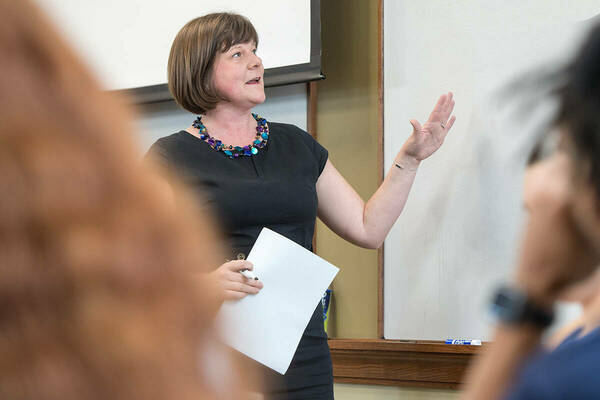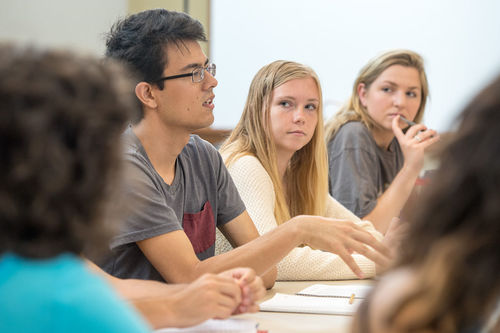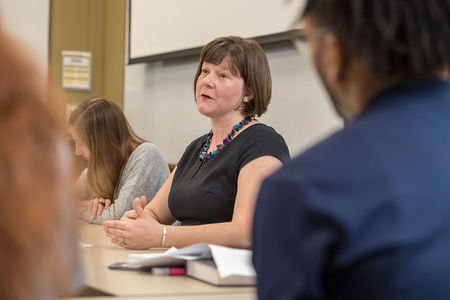
 Jessica Collett, an associate professor in the Department of Sociology, has won the 2017 Sheedy Excellence in Teaching Award, the highest teaching honor in the College of Arts and Letters.
Jessica Collett, an associate professor in the Department of Sociology, has won the 2017 Sheedy Excellence in Teaching Award, the highest teaching honor in the College of Arts and Letters.
The first social psychology course that Jessica Collett took as an undergraduate left her wanting more.
While the topic was fascinating, the examples in the textbook were dated and didn’t resonate with her or her fellow students.
“As much as I liked that textbook, I watched my professor struggle to use it,” Collett said. “I wanted to go to graduate school so that I could teach sociology using examples that people could actually understand.”
Now an associate professor in Notre Dame’s Department of Sociology, Collett has won the 2017 Sheedy Excellence in Teaching Award — the highest teaching honor in the College of Arts and Letters, which will be presented at a reception in her honor on December 5 at 3:30 p.m. in the McKenna Hall auditorium.
And she’s now the co-author of that same textbook from her first sociology class.
“It’s really neat to come full circle and now be writing the same textbook that made me interested in the subject in the first place,” said Collett, currently working on the ninth edition of Social Psychology. “I incorporate examples I hope a variety of students can connect to, including non-traditional learners and those who were raised in a different time or consume different culture.”
Inspiring enthusiasm
In her classroom, Collett hopes to spark the same passion she feels for sociology in her students.
“Even if they aren’t sociology majors, I want my students to be as excited about the topics as I am and to see sociology’s relevance to the worlds they inhabit,” she said.
That enthusiasm is part of the reason she was chosen for the Sheedy Award, said Sarah Mustillo, professor and chair of sociology.
“Notre Dame has many outstanding teachers, but I can’t imagine anyone more deserving of the Sheedy Award than Jessica Collett,” Mustillo said. “Without a doubt, she is one of our department’s most valuable assets in the classroom.”
 Students engage in discussion during one of Collett’s recent sociology classes.
Students engage in discussion during one of Collett’s recent sociology classes.
Her approach has inspired many students to major in sociology, Mustillo said, including one who wrote to recommend Collett for the award.
“My second class at Notre Dame was Introduction to Social Psychology, and it immediately challenged much of what I thought I knew about society, gripping me like few other classes have,” the student wrote. “Professor Collett employed everyday examples and never shied away from difficult topics such as race, wealth inequality, and sexism. Because of that, I learned to have the courage to address those issues as well.”
Collett’s real-world examples come from all different sources — from pop culture to toys and games. Children’s board games, for example, can reflect and subtly shape expectations of gender roles and behavior, said Collett, who has a concurrent appointment in the Gender Studies Program.
In the game Chutes and Ladders, she said, the board has pictures of girls engaged in mostly “safe” inside activities — baking cakes, doing dishes, and eating cookies— while the boys engage in riskier outdoor behaviors like climbing trees and skating on thin ice.
“We know that women and men have different risk preferences,” Collett said. “Men are more likely to do things like speed or not wear seat belts, and that’s partly because when women are growing up, they’re raised very close to their parents. They spend more time in the house, whereas boys are allowed to venture out more. Even today, a little girl is more likely to be walked to the bus stop than a little boy.
“Talking about these games gets students thinking about the different ways we treat young girls and boys and about how we are socialized into our gender.”
Creating understanding
Women’s tendency toward risk aversion has both positive and negative consequences, Collett said. While women may be less likely to speed, they are also less likely to seek a promotion in the workplace or negotiate for a higher salary when they receive a job offer.
And they are much more likely to experience the “imposter phenomenon” — a concept she focuses on in her research involving people who feel undeserving of their own successes and achievements.
Collett has talked with her students about her research, both in and outside class, and hopes that knowledge will better equip them for their own futures.
“I’m particularly interested in imposter feelings among graduate students and how they can shape career trajectories and aspirations,” she said. “Research shows that if you find out that the imposter phenomenon exists and you can label it, then you understand that you can conquer it.”
Collett’s contributions to the department’s graduate program — where she served as director of graduate studies from 2013 to 2016 — have been invaluable, said Rory McVeigh who was chair of the department at the time.
“As director of graduate studies, she put into place an extraordinarily supportive structure that provides students with top-rate advising and professional socialization experiences,” he said, “while developing innovative mini-course offerings designed to help our students be more competitive on the job market.”
She has also conducted both quantitative and qualitative research on graduate student professionalization.
“I think I became even more passionate about my research with graduate students after I was DGS,” she said. “But I really see my research, my roles in the University, and my teaching as all part of a whole.
“In my research and in my teaching, I want to make a difference — I want to help us understand the social world in a way that creates more equality, or at least more understanding.”
“Even if they aren’t sociology majors, I want my students to be as excited about the topics as I am and to see sociology’s relevance to the worlds they inhabit."
Genuine compassion
Collett, who joined the Notre Dame faculty in 2006, is also a faculty fellow in the Kroc Institute for International Peace Studies and a faculty affiliate of the Center for the Study of Religion and Society, the Environmental Change Initiative, the GLOBES graduate training program in environment and society, and the poverty studies interdisciplinary minor.
 Collett leads discussion during a recent seminar.
Collett leads discussion during a recent seminar.
This fall, she is teaching a class called Socialization in the Life Course, exploring how external influences shape who we become throughout our lives, along with a new course she designed — Social Psychology for Pre-Health Students.
The course not only addresses social science concepts that are now on the redesigned MCAT, but also adds a valuable dimension to students’ understanding of their future occupations in the medical field, she said.
“My hope is that if a first-year student is taking this sociology course alongside organic chemistry — and understanding that both will help them become better doctors — it will remind them why they want to be in medicine in the first place and help retain students in the pre-health program,” Collett said.
While Collett continuously works to find new and more engaging approaches to teaching sociology, it is her dedication to her students that truly sets her apart, said an alumna of the Ph.D. program.
“She excels both in research and in the classroom,” she wrote. “But what makes her a great teacher isn’t just her innovation and creative teaching methods, but that she genuinely cares about her students. Her devotion to her students is reflected in her dedication to support, advocacy, and mentorship.
“Without Jessica’s guidance, I would not be the researcher, teacher, or mentor that I am today.”
Originally published by at al.nd.edu on December 05, 2017.